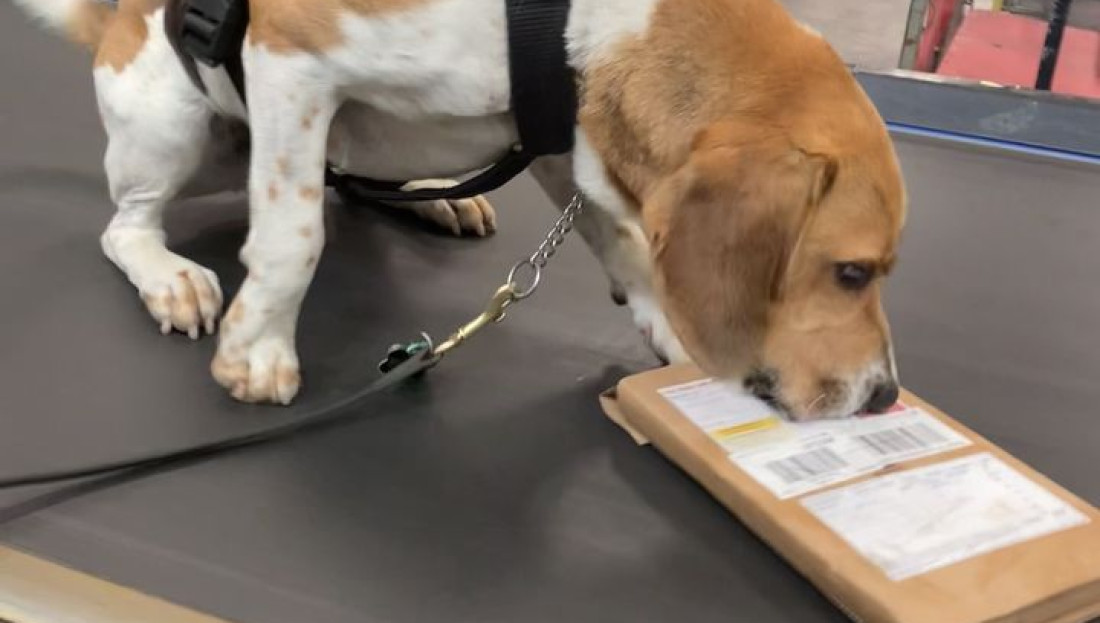Spotlight on a Pledge member: NZ Post – on the frontline of biosecurity
Date
19 March 2024
With biosecurity threats increasing at the border, NZ Post’s International Mail Centre (IMC), has a critical role to play alongside Biosecurity New Zealand (BNZ) in preventing the introduction and spread of harmful organisms in New Zealand. The IMC takes pride in its commitment to protecting the country from potential biosecurity threats which may include invasive species, plant diseases, pests and prohibited items such as seeds, plants, animal products and soil.
The team at the IMC work closely with BNZ every day, ensuring risk items do not slip into the country. When containers and air cans arrive, they are loaded to the interchange area where NZ Post APs (Accredited Persons) perform checks, then the devanning process takes place. Items are placed on a conveyer belt to go through the x-ray screening machine for BNZ to decide whether further inspection is needed. Around 1.3 million items each month pass through the x-ray system and about 4,000 are further inspected with extra biosecurity checks. Once items are cleared, NZ Post load them into their GSCAN technology, giving visibility and traceability to each package. This is important and may come into play if an item needs to be recalled because of a post-clearance biosecurity threat being identified. Even when an item has been delivered to its destination, NZ Post can reclaim it to do further testing with BNZ using a ‘Return to base’ process.
Biosecurity risk management in action
- The strong, co-operative working relationship with BNZ means that there are frequent opportunities for positive outcomes. Recently an item was sent from the Congo to Australia via New Zealand. BNZ worked with NZ Post IMC to identify the package as a risk item and investigation revealed that it was infested with bugs identified as Trogoderma insect and Dermestid beetle.
- During the Foot and Mouth (FMD) outbreak in Indonesia, NZ Post had to act as a matter of urgency, supporting BNZ in implementing a new system to manage this emerging and serious threat. A ‘stop’ was placed on all items from Indonesia for BNZ inspection which meant that items could be clearly separated for enhanced intervention measures.
Furthering biosecurity capability and capacity
Biosecurity at the border is set to get a boost when the Auckland Processing Centre (APC) goes ‘live’ with inbound items in September this year with a major re-design of the automated mail handling system that will introduce new scanning technology.
The Pledge’s key point of contact at the IMC, Operational Compliance Manager, Oscar Montano (pictured), says improved technology will enable biosecurity risks to be seen in 3D, with much more accuracy.
“The process at IMC is much more manual compared to what we will be able to achieve at the APC. Images will be more realistic, and the process will be more accurate.
“We’ve also been working closely with our border agency partners, on ‘data for mail’, where our sortation machinery will be able to read items passing through International UPU Inbound (mail that is sent from overseas) and attribute data to Customs and MPI.”
Oscar points out that Pledge member companies can support the IMC and the biosecurity system by reaching out to their supply chains to raise awareness of good biosecurity practice when posting and, on a more personal note, ensure that online shopping purchases coming from overseas are fully compliant with biosecurity regulations where appropriate.
Oscar says that NZ Post joined the Biosecurity Business Pledge so they could actively engage with other organisations to share knowledge and learning. As part of the Auckland Airport (also a Pledge member) community, they are regularly audited by the airport and have implemented some of the tactics that the airport use in creating their ‘culture of biosecurity’. As well as displaying banners and posters of current risks, there is a physical biosecurity communications board dedicated to showcasing important and timely information so team members can learn about risks.
Originally from Mexico and having just enjoyed his second summer in New Zealand, Oscar has a background in mechanical engineering and a Masters in Quality. His statistical and analytical expertise have been instrumental in supporting development of the IMC’s systems.
